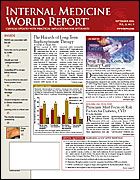Publication
Article
Internal Medicine World Report
Homocysteine Lowering may not Improve Cognition
Author(s):
Surprising New Findings about B Vitamins
Evidence suggests that persons with dementia may have higher serum homocysteine and lower folate and vitamin B12 levels than their nondemented peers. Since folate supplements, with or without vitamins B12 and B6, lower plasma homocysteine, it has been postulated that these supplements could protect against cognitive decline.
N Engl J Med
Although 2 trials found that B vitamin supplements had little effect on cognitive function in the elderly, both lasted <4 months, leaving the issue far from settled. Investigators now report reaching the same conclusion after a much longer, 2-year trial (. 2006;354: 2764-2772).
This double-blind, randomized trial included 276 healthy adults aged ?≥65 years with fasting plasma homocysteine concentrations ≥13 ??mol/L and normal plasma creatinine concentrations. Participants were randomized to a daily supplement containing 1000 ?g folate, 500 ?g vitamin B12, and 10 mg vitamin B6, or to placebo.
At baseline and at 1 and 2 years, 8 neuropsychological tests were performed, including the Mini-Mental State Examination, Rey Auditory Verbal Learning Test, and Wechsler Memory Scales, to evaluate cognitive function, memory and learning capacity, verbal fluency, and information-processing speed.
P
As expected, plasma total homocysteine concentrations were lower, and folate and vitamin B12 concentrations were higher, in the vitamin-using group at 6, 12, 18, and 24 months, with a mean overall difference in plasma homocysteine of 4.36 ?mol/L, compared with the placebo group ( <.001).?
P
But it was unexpected that the combined score for all 8 tests of cognition was?0.11 SD scores poorer in the vitamin group than in the placebo group (?= .05).
IMWR
"The results of our trial showed no improvement in cognitive performance in those receiving B vitamin supplements," coauthor C. Murray Skeaff, PhD, Department of Human Nutrition, University of Otago, Dunedin, New Zealand, told . "Surprisingly, the trend in scores on all tests of cognition, with the exception of 1 test, was for lower performance in participants who took the vitamin supplement."
Thus, despite the apparent inverse correlation between homocysteine and dementia, Dr Skeaff said, "As a screening tool for cardiovascular risk or impaired cognitive function, measurement of homocysteine is not warranted, primarily because the therapeutic benefit of lowering homocysteine with B vitamins has not been substantiated and the risks not adequately determined."
The one exception would be patients with kidney problems, Dr Skeaff said, since "homocysteine concentration rises considerably as kidney function deteriorates, and at extremely high concentrations homocysteine can be acutely damaging."
N Engl J Med
N Engl J Med
For now, physicians should not recommend folate and vitamin B supplements to their older patients, Dr Skeaff said. "At this stage, we should await the results of several ongoing trials of homocysteine-lowering vitamins on cardiovascular disease." He noted, "The results of the NORVIT [Norwegian Vitamin] trial [. 2006;354: 1578-1588] suggested a harmful effect of combined B vitamins on cardiovascular disease. Furthermore, the results of a small trial [. 2004;350: 2678-2681] in patients undergoing coronary angioplasty showed increased restenosis rates" with folate therapy.
"Given the recent history of adverse effects in large trials of antioxidant supplements, notably, beta carotene increasing risk of lung cancer in smokers and vitamin E increasing the risk of premature death, it would seem prudent to await the completion of current homocysteine-lowering trials, at which time a clearer picture of the potential risks and benefits will become more evident," he stressed.
After expressing interest in what future trials will show, Dr Skeaff said, "Evidently, as my speculative comments imply, medical discovery about homocysteine, cardiovascular disease, and cognitive function is at a stage where there is no clear and substantiated direction for the treatment of primary care patients."
Key points
The role of homocysteine in health continues to perplex the experts, as increasing evidence shows that improving its levels does not necessarily improve health.
Folate and the B vitamins have been shown to lower homocysteine levels, which are increased in persons with dementia, but supplementing with these vitamins does not appear to improve cognition.
Physicians should not recommend these supplements to elderly patients to enhance their cognitive function until more data become available.






